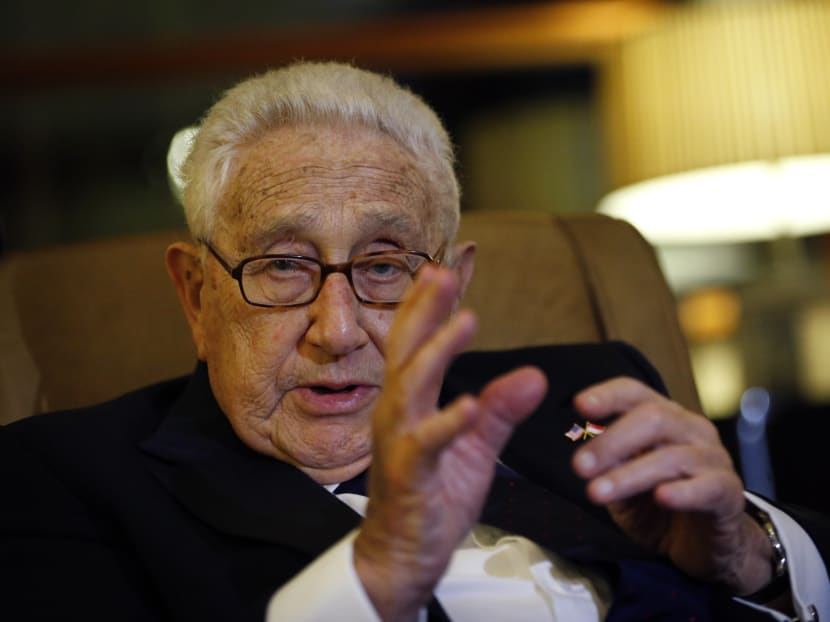Lee Kuan Yew meant a lot to me: Kissinger
SINGAPORE — As he paid his last respects to an old friend today (March 28), former United States Secretary of State Henry Kissinger, 91, could not contain his emotions and teared up as he walked away from the casket of the late Mr Lee Kuan Yew.

Former US Secretary of State Henry Kissinger speaks to reporters after paying his respects to the late Lee Kuan Yew, on Saturday, March 28, 2015, in Singapore. Photo: AP
SINGAPORE — As he paid his last respects to an old friend today (March 28), former United States Secretary of State Henry Kissinger, 91, could not contain his emotions and teared up as he walked away from the casket of the late Mr Lee Kuan Yew.
Speaking to reporters later, Dr Kissinger said: “He meant a lot to me. It was not a friendship of doing things for each other, it was of learning from each other, but it was not a friendship in which you ask favours ..."
He added: “What I liked most about Lee Kuan Yew was...When my wife and I came (for a visit)...you could see it gave him great joy, he never said it...it was an atmosphere.”
Dr Kissinger had first met Mr Lee in 1967 when Singapore’s founding Prime Minister was taking a sabbatical at Harvard University.
Arriving in Singapore yesterday, Dr Kissinger is part of a US presidential delegation attending the state funeral service tomorrow. The delegation is led by former US President Bill Clinton.
Earlier this week, the Washington Post published a moving eulogy written by Dr Kissinger, in which he described Mr Lee as a great man and a close personal friend whose leadership would be missed by a chaotic world.
Dr Kissinger had wanted to visit Mr Lee when he fell ill recently but Mr Lee was not in the condition to receive him.
On what he felt was Mr Lee’s most significant legacy, Dr Kissinger said that Mr Lee raised the standards of living in Singapore to “heights that would have been unimaginable before”. “And at the same time he became a world figure (who) could be well received by world leaders. It’s an amazing phenomenon. I can’t think of any other single person who played that role and...I respected him.”
Dr Kissinger recalled that Mr Lee was “never a lobbyist”, when he was asked by reporters how Mr Lee had shaped US’ thinking on China. “He always urged us to understand China, and explained what the Chinese were doing...and so I found his advice extremely helpful but so did the succession of presidents and others,” he said. Hailing Mr Lee’s influence as a statesman, Dr Kissinger declared that the world is “a better place for Lee Kuan Yew”. “He taught us about the way Asians think, and he explained to us what development meant in a practical sense. But (he always said) he can do that much, beyond that somebody else had to do something.”
Dr Kissinger was speaking to Singapore and international media at the residence of US Ambassador Kirk Wagar. During the interview, he was also asked about the South China Sea territorial disputes involving China and some Southeast Asian countries such as the Philippines and Vietnam.
The US had previously voiced its displeasure with China’s conduct. Asked by the international media if his country should take a more aggressive stance, Dr Kissinger said the issue is whether China and the US can “find a way of having a dialogue”.
Noting that Chinese President Xi Jinping will be visiting the US this year, Dr Kissinger said he hoped the China and US leaders will have a successful discussion on the matter. Nevertheless, he suggested that countries involved follow the doctrine of former Chinese President Jiang Zemin, which was that “not every problem needs to be solved in the existing generation”.









